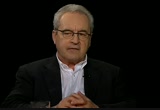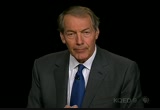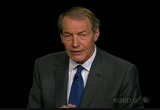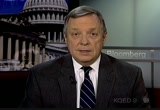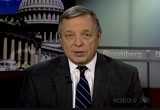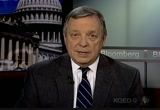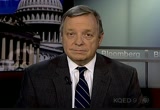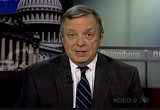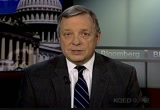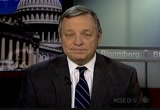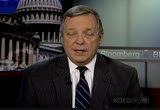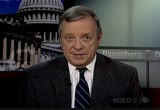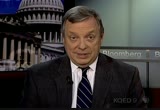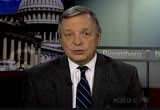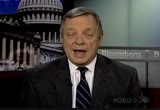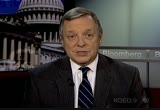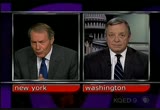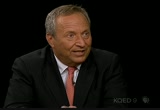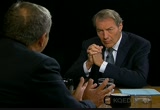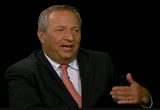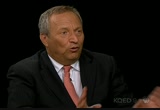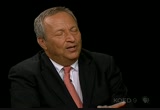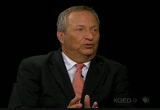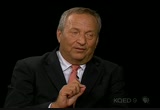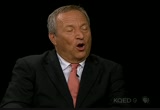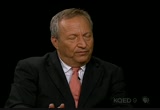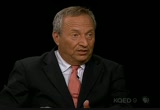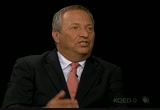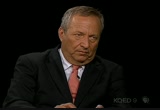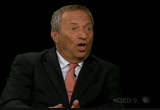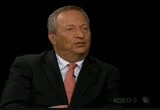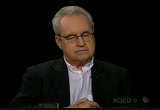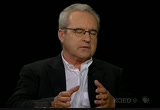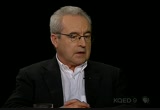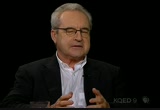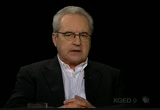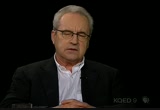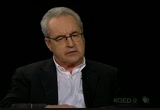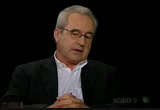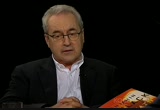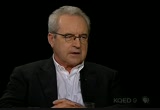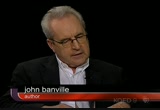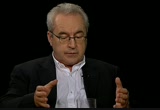tv Charlie Rose PBS July 14, 2011 12:00pm-1:00pm PDT
12:00 pm
>> charlie: welcome a our program. once again we begin with the debt limitation talks in washington. here from a man who was at the last whitehouse talks, the number two democrat in the united states senate, dick durbin. >> senator mcconnellas made a good positive sgestion. we discussed it at length among the democratic senators today. with or without a deal, this motion of giving the president the debt and giving congress the power to disapprove. it's at least a viable alternative. i certainly have not rejected it. i'm working with senator harry reid our majority leader to find a way to craft that in a bipartisan approach in the senate. >> charlie: wcontinue part two with our conversation with larry summers the economic professor, harvard university president and economic as vier
12:01 pm
to president obama talking about the state of the economy. >> at the center of this if the people don't build new factories, then the factories they're using aren't fully operating. developers don't build new develoents when the developments they've already built are sitting empty with the lights out. and that's why i do keep coming back to demand. >> charlie: we conclude this evening with a conversation of the irish novel else john banvil. >> i have to try to get near to perfectionism as i possibly can. there's more calculus, getting near and near and near. i keepeedi to get nearer and nearer and i don't ghere but i keep pushing.
12:02 pm
i should say he writes very fluently, very swiftly and doesn't linger over sentences. >> charlie: durbin, summers and banville when we continue. if you've had a coke in the last 20 years, ( screams ) you've had a hand in giving college scholarships... and support to thousands of our nation's... most promising students. ♪ ( coca-cola 5-note mnemonic ) every story needs a hero we can all root for. who beats the odds and comes out on top. but this isn't just a hollywood storyline. it's happening every day, all across america. every time a storefront opens. or the midnight oil is burned. or when someone chases a dream, not just a dollar.
12:03 pm
they are small business owners. so if you wanna root for a real hero, support small business. shop small. captioning sponsored by rose communications from our studios in new york city, this is charlie rose. >> charlie: the confrontation and stand off about raising the federal government's debt limit continues today in washington. president obama again met with congressional leaders at the whitehouse. what is new is a proposal from senator mitch mcconnell the republican leader in the senate who believes a bipartisan deal
12:04 pm
is unlikely. he proposed a last choice option that would all theresident to unilaterally raise the barring limit up to $2.5 trillion in three stages over the next year. whitehouse reaction came from the president's spokeman jay carney. >> this is not a preferred option the president is firmly committed to significant cut in spending, and to dealing with our deficit and debt problems in a balanc way. he's been saying every y in ese negotiations, these talks with congressional leaders and he will say again today, this afternoon when they meet that as they essentially assemble the buildinglocks for possible coromise in terms of cutting spendi, reforming entitlements potentially and obviously finding savings in the tax code, bigger is better. >> charlie: how much everyone in washington knows time is running out on a bipartisan deal. tim geithner said the u.s. will
12:05 pm
default on its debt obligations on august 2nd. in the last this hours, president obama and ben bernanke have warned of dire conseqnces if no deal is reached. >> i think the worst outcome if you don't raise the debt limit at some point, that we default on the debt and that would create, as i said before, a huge financial calamity which in turn would affect everybody and would set job creation back very significantly. but even if we can -- >> is that quantifiable. >> we saw what happened in 2008, 2009 we h two consecutive quarters of 6% negative growth in the economy. i think something of that order is certainly conceivable. >> charlie: coness woman michele bachmann who is seeking the republican nomination for president and leads the polls i iowa raed questions about some of the consequences of default. >> we were all shocked and appalled that president obama
12:06 pm
dangled out in front of the cameras that senior citizens may not get their checks. that's a very dangerous statement to mak we don't believe -- excuse me, excuse me. we d't believe that for a moment. as we said, there are sufficit funds in the social security trust fund right now make sure that they get checks. and that's the responsible thing that we as members of congress need to do. >> charlie:also today, moody a rating agency warned that the united states may lose its triple a bond rating if the congress fails to increase the debt ceiling. joining me from washington is democratic senator dick durbin from illinois and he's a key participant in the talks between the white house and congressional leaders. >> it's good to with you, charlie. >> charlie: tell me where it stands where we speak having just left the whitehouse. >> we have no agreement. we're still working on it. this is ourifth meeting with the president, face to face. ese meetings have gone on from an houro an hour and-a-half
12:07 pm
and longer. the president is personally invested in this. i have to say he's a very patient man to suffer eight congressional leaders of the different flit -- political parties and all of our views on the future of america. and he's determined that we are going to make certain that the debt ceing is extended and we're going to makeome important decisions to reassure the world that we are going to get our fiscal house in order. >> charlie: what do you make of senator mcconnell's action today? >> i think senator mcconnell has made an overture to all of us in an effort to try to avoid a disaster. we were warned by 300 business leaders across america yesterday, the failure to extend the debt ceiling would be catastrophic in terms of our economy, in terms of the loss of jobs. and endangering businesses. and what senator mcconnell is trying to do is find a political way through this. so many members of congress,
12:08 pm
house and senate primarily on the other party said have flat out said we're not going to vote for a debt ceiling extension. we know it has to be extended but they're not going to be there for us. what senator mcconnell is trying to do is find a political way for them to shift burden to the president so that he can extend the debt ceiling and then the house and senate can react. >> charlie: that's an option although jay carney said n the preferreoption for president obama. >> it'not preferred. let me tell you,t's widely sunderstood that the debt ceiling's all about. we are paying for things we've already done. of the same members of the house and senate who have voted consistently, for example, to fund our wars are now saying they don't want to borrow the money to pay for it. that's not resnsible. what we have to do is to make certain that the debt ceiling is extended. we have never ever defaulted once in our history. what our business leaders and our leaders at the treasury and other places tell us if we even hint we're going to development
12:09 pm
it's -- default it will raise interest rates. >> charlie: some people took note what senator mcconnell said raising the debt ceiling could have consequences for his party and the republican brand. some people in the marketplace says that's good news to hear because it shows a recognition of what you just said, the consequences of a default. do you see it that way? >> i sure do. i mean, we really have to look only to iowa and listen to the republican presidential candidates, one former governor of the mid western states saying it really doesn't make any difference. others saying that they're praying that we will default. i mean you listen to this andit is totally irresponsible and to think these people are aspiring to literallybeinthe president of the united states it's hard to reconcile these statements. i'm glad senator mcconnell stepped up. i think it was a responsible statement. it's accurate and i hope we can build on it. >> charlie: do you believe
12:10 pm
there's a deal possible and if so, what would behe outlines of that deal? would we be talking about $2.5 trillion rather than 4 trillion over ten years. >> throughs no doubt we could reach 2.5 trillion or more if we were willing to do what the simpson, the deficit mmission recommended, put everything on the table. spending, entitlements, revenue. if we put everything on the table, we could hit 2.5 and maybe more. but unfortunately, we've had this statement from republican leaders in the course of the meeting that they won't consider voting for any revenue under any circumstances. they will not impose any new tax burden on any american, even the wealthiest among us. >> charlie: simply by eliminating deductions, you're talking about raising revenue, correct. >> well their argument is i think tortured but that's what it is. they say to eliminate any deduction or credit or special treatment in the tax code, is to
12:11 pm
raise taxes. even if the policy behind it is questionable. and if we can't eliminate what clearly are loopholes which are indefensible at this time in our history, for example, that we are continuing to subsidize oil companies when they are realizing record breaking profits in the history of american business mak no sense. when we started to remove it, many republicans said no, we have to continue that subsidy or we will be accused of raising taxes. so if we can't eve reach that point in the conveation, it's very difficult to have what i consider to be a rational discussi. >> charl: so whato you think is possible? in the context of understanng how they have said that. >> i think we will. i think it's possible to cut spending. i think we can do that. there's a point beyond which i'm very concerned about the impact on some program and i think there are savings we can make in mandatory programs which is another section in the budget. but it's very difficult to reach the target the republicans are now saying 2.5 trillion or 2.6
12:12 pm
to match the extension of the debt ceiling if you don't bring in entitlements and revenue. and since they won't bring in revenue, there's no appetite to discuss entitlements on the democratic side. >> charlie: shouldn't the democrats put forward though in order to generate some dialogue on the subject of entitlements. >> we put it forward. i mean, we have talked about it. of us have gone even further. voted for the bull simpson deaf -- deficit commission. some of my friends disagreed strongly with what i decided to do. i strongly believe we can make soci security stronger beyond the 25 years it's anticipated to be solvent. i think we can make medicare stronger, even as we face the babyboomers coming in to be part of the progr and we need to have thadiscussion. but tohave thatdiscussion and to ask any sacrifice from anyone involved, really i think we have to have everything on the table. and that would ilude revenue.
12:13 pm
>> charlie: senator mcconll seemed to be looking at the political dimensions of this when he said the republicans if a default happened would have co-ownership of the economy and that would ensure the re-election president obama. is he right? >> there's some truth to that. i've been around washington long enough to remember when newt gingrich and rush limbaugh and a few others said listen we can close down the federal government, no one would notice. well people noticed and they weren't very happy about it. they blamed speaker gingrich and his membership for that result. and he was spirited away from that position as speaker not long after. i think that senator mcconnell has that same memory. right now they want to blame president obama for the economy and all of its weakness and if they end up stumbling and not extendinthe debt ceiling and it gets worse, then there's at least co-ownership, if not blamed to be shared more by the republicans than democrats. >> charlie: if this was left to you and senator coburn of
12:14 pm
oklahoma, do you think you could solve it >> i think we can come close. i've worked with tom and he's worked with this gang of six. there are others inlved that are important part of it. kit conrad, mark warner mike -- the six of us were close and i haven't given up on that effort. in fact, conversation continues. i think there's a wayhrough it. it's painful but it's balanced. it's certainly in the st intere of this country. if we gavehis economy a boost, a shot of confidence in saying that we have a plan that's gng to reduce this deficit or about $4 trillion over the next ten years, i think it would have a dramatic positive impact on the growth of our economy. >> charlie: do you believe, you as a senator from illinois believe if you can not get the deal, that you'd be prepared to accept the mcconnell id. >> i can tell you, senator mcconnell has made a good positive suggestion. we discussed it at length among
12:15 pm
the democratic senators today and even with or without a deal this notion of giving the priden power to extend the debt ceiling and giving congress the power to disapprove is a strong alternative. i certainly have not rejected it. i'm working with senator harry reid the majority leader to see if we can craft that as a bipartisan approach in the senator. >> charlie did something come out that might build on what mcconnell's suggesting to provide a way out of this? >> that's exactly right. i think senator mcconnell has given us at least one legislative path we could follow. >> what would you add to it to make it agood plan? >> well one of the things senator reid has pushed for and i think is sensible to call together bipartisan group and 's talk big a joint committee with the power of committee, the staffing of the committee and really come up with specific recommdations on dealing with this deficit in the longer term
12:16 pm
and consider everythi. literally everything. spending, entitlements, revenue, put it all together and try to come up with something that might be done on a bipartisan basis. you know we've come close to bull simpson even with the gang of six and perhaps this approach will be what's needed. >> for the benefit of the audience because you're familiar with it, lay out the specifics of the mcconnell plan. >> well, here's how it would work. firms the congress would give the authority to the president of the united states to request and to execute debt ceiling extension. then it would under another process that we he, another law, give the authority to congress to disapprove that action. so there would be a resolution of disapproval considered first in theouse then in the senate. if the resolution disapproval would pass, the majority vote would be taken to pass it in both the house and senate and sent to thepresident it's obvious he would veto it because he's being told congress disapproves of his action. then an ovride of the president's veto requires two
12:17 pm
irds vote. so at the end of the day say 34 senators saying the presint was right to extend the debt ceiling it would go threw. shift the burden to the decision of theresint is giving congss the ght to disapove if they choose to do that and the president the right to veto. so it's a, it is a labored process but it is one that reflects the political reality whe so many members have said they just can't even consider voting for a debt ceiling extension. >> charlie: so bottom line there's a sigh of relief within the councils that you're working and discussing in washington because you know at the end there's a way out. >> yes. it's positive in that respect and i'll tell you it's spec only that congress would vote the appropriations bills, vote for the tax bills and then disapprove when the president said well i have to borrow money to pay for those things. i think congress is trying to get off the hook politically. i don't think that is
12:18 pm
responsible and from a constitutionaliewpoint i rtainly don't approve that apprch but i don't want toee us fail to extend the debt ceiling and face an economic disaster. >> charlie: the president oke of this. if there is a default, there will be a delay in sending out social security payments. >> it could be. here's what the president would face august 3rd if we didn't extend the debt ceiling. the government would have $172 billion in resources and it would need 306 billion to pay for social security for medicare for veterans benefits, for federal workers for defee contractors and the ordiny expenses of government. so a decision would have to be made who is ing to beaid and who won't be paid. at the sam time we're going to face almost $100 billion a week of former lending that has matured and now has to be renewed. so we have to go out on the market having jt basically defaulted, try to find someone to loan us money and be facing
12:19 pm
higher interest rates. if those interest rates go up, of course the cost of government goes up with them and i'm afraid the income, pardon me, the interest rates across o economy will reflect that. >> charlie: can you say there's something in the intensity of this debate in terms of fiscal reform and tax reform that perhaps there is a benefit, people are looking and thinking about these two issues in way that they had not before. >> i think it does focus our attention. it is ironic it's over the debt ceiling because when you look at the history of the debt ceiling law itself, we've extended the debt ceiling 89 times since this law was enacted in 1939. ronald reagan, the psident who was convenient raid in -- venerated. he holds the record for increasing the debt of the united states in s eight years in office. second is president george w.
12:20 pm
bush who extended the debt ceiling nine times in fact during his presidency almost doubled the debt of the united states. so now we're being preached to by the otherarty abouthow the debt ceiling is so onerous. the fact is, republican presidents as well as democrats have used the debt ceiling to meet our obligation. i think the public's a little more aware of this now and i think we're more aware of the fact that beyon thrises, we need to really address our national debt in a meaningful way. >> charlie: last question. when you get up tomorrow morning, where will be the focus? what is it you will be working on tomorrow? >> i'll be working with senator harry reid and senator mcconnell to see if there's a way we can avert this crises with the debt iling. i ho tha we can do it on a bipartisan basis. if the senate shows bipartisan leadership on that, i hope that we can get through at least this challenge. e ahead. it would be better the we had a bipartisan agreement to deal with this deficit. i hope the president can achieve that. >> charlie: did you or anyone
12:21 pm
else have anything to do with encouraging mccoell to do this? >> no. senator mcdonald did this on his own volition and it was a little bit of a spris he called senator reid and said i hope youon't comment on it. senator reid agreed yesterday to do this so at this point they're trying to work together to at least have this as a back up plan if the esidential he was are not successful. >> charlie: and if i'm right, i thin speaker boehner has said work well done, that it offers a possibility. >> well i hope so. you know, we understand when we close the door to this meeting with the president and the cabinet room, every person there, democrat and republican alike say we understand we cannot default on america's debt. when the door's open and people appear before camera you may hear a different story. there's a sense of rhesus looks and seriousness in that room. >> charlie: senator durbin thank you so much for joining us
12:22 pm
on this very important day. thank you. >> thanks charlie. >> charlie: and this evening, part two of our conversation with larry summers, this time the economy, where it is and where it's going. what is necessary torestore economic growth and at the same time lower the unemployment rate? >> charlie, i'm not satisfied at all where the economy is but let's be clear. the economy is growin the economy is, income is greater eachuarter than the previous quarter, the number of jobs being created has been positive every month for over a year. so we've got serious problems but let's not make them worse than we are, than they are. what do we need to do to accelerate growth to a more fective -- >> charlie: while you'r doing the kind dicit fighting that is demanded by the
12:23 pm
politics. >> we need in the short run more demand, how best to get it. the payroll tax cut that the president drove at the end of last year was the right thing. it should be extended for another year and the payroll tax cut should be given for employers as well as for employees. so as to encourage hire. it is a crazy time to be e limiting unemployment insurance of an extended unemployment insuranc and reducing the ability of the unemployed to spend. the easiest jobs to create are the prevention of the destruction of jobs in the state and local sector. there is no reason why kids should be going to school only four days a week because we can't support state and local governments. and we can put people back to work. one of the important deficits we have in this country is the
12:24 pm
infrastructure deficit. where kids are going to class rooms where paints are chipping off t walls. that's an infrastructure deficit. we can put people to work. >> charlie: why didn't we do that in the original -- >> we did. we should have -- wedid. we did as much as we could pass politicay, and we did abo as much as the system could move the money quickly. what we needed to have done was to have maintained the momentum of that more fully. the president proposed that in the fall of 2009 actlly, and the house of representatives passed it. unfortunately the senate didn' pass those measures and so we didn't get the kind of sustained impulse throug2011, that would have been, that would have been ideal. >> charlie: is there anything else in terms that you would do to accelerate growth and reduce
12:25 pm
unemployment. >> the key, the key to increasing growth and reducing unemployment is increasing demand. >> charlie: right. >> one crucial source of demand is the variety of things the government can do tha i described. another is incased exports. and there's a lot of we can do to promote, to promote the sale of american goods abroad. the bank can do more to provide financing for american exporters. if you look at the trade agreements that are before the congress, they don't change in any portant way the trade barriers in the other states but we do -- >> charlie: should we have more of an export consciousness than you suggested we ought to have today. in other words you look at germany and china they are two export models of successful economies. >> i think we've suffered as a
12:26 pm
country from having inadequate export consciousness. it's a chronic problem of large countries. china because all the wealth is on the coast has attempted to avoid it. it's something we worked on very hard in the clinton administration, the late ron brown pushed an idea called commercial diplomacy. we passed a whole set of trade agreements. much of that and much of the advocacy of u.s. products was lost in the subsequent eight years. 've been trying to bring that back. we've also been trying, i think this is very important to recognize that exports isn't just about manufactured goods. we badly under perform as a country in perms o attracting toists from abroad. some of that is because it's so hard to get a visa to come to this country. some of it is because we don't organize ourselves to promote
12:27 pm
the united states as a destination in the way that other countries do. and if you think about jobs for ordinary people, there are a large numberf jobs in tourism and that's an area also where we can do much better. >> charlie: what is the real reason for the absence of confidence so that construction and everything else is not moving ahead. >> charlie, i think the center of it is demand. as long as you have empty malls. >> charlie: right. >> nobody's going to want to build a new mall because it's just going to compete with the mall that's already there and is emy. it doesn really matter what the zoning regulations are. so the most important part of it is demand. now, that having been said, are there things we can do that
12:28 pm
would eliminate meaningless ill advised regulation and increase investment spending? yes, i'm sure at there are such things and that's something the administration has increasingly, perhaps somewhat belatedly been emphasized in recent months. >> charlie: you mentioned financial reform and a the regulations going to com o of that having no effect in terms of either financial sector or the business sector in general. >> no. that's not quite what i said. people who used to be able to put 1% down and start a major real estat development are finding they have to put more than 1% down. bank that used to be able to fund a loan without having any equity at all or hardly any
12:29 pm
equity at all are no longer able to do that. so the financial reforms are reducing the leverage in e system. that's the right thing to do. could we have taken on fewer issues in the financial reform bill andused only on the ones that were most important for stability? i think that's a reasonable gument. and i think the fact that the regulators are not getting every rule making done on te butre trying to proceed carefully the frankly the prudent thing to do. but at the center of this, at the center of this, if the people don't build new faories, then the factories they're using aren't fully operating. developers don't build new developments when developments they've already built are
12:30 pm
sitting empty with the lights out. and that's why i do keep coming back to demand. >> charlie: if in fact the president has to capitulate to the republicans on this issue, in order to make sure this government doesot go into default, the casualties will be number one a missed opportunity to deal with the deficit, your point. number two, there will be a t in the level of human services that you and others believe are essential part of the social compact with its citizens, especially those who have earned entitlements. okay? thirdly, what damage to the economy -- >> an alternative -- depending on what hypothetical agreement was reached, this economy needs more support and needs more demand. and unless whatever happens provides for more support and more demand, we are increasing
12:31 pm
the risk ththis expansion ll further slow. we are with an economy that right now is dangerously close to stall speed. that's what you're saying when you're talking about growth at a 2% rate. growth at a 2% rate isn't enough even to keep unemployment constant. >> charlie: you have to go higher to 9.2% if the growth rate remains at 2%. >> remains at 2%. and economies that are growing that slowly, like airplanes that are flying below a certain speed have a tendency to fall further. and so that's why i keep coming back so i know everybody wants to talk about the long run deficit picture, and that is terribly important. >> charlie: the rest of the world wants to talk bit. >> well the rest of the world is
12:32 pm
also dependent on the strength of the u.s. economy. the u.s., the united states the importer of last resort for the lastecade, and if the u.s. economy ows further, that's going to have consequences for economies aroundhe world th depend on u.s. markets. and that's why i come back crucially not justo the budget, the long term budget content of any agreement that's reached and not just to t question of what it means for credit worthins, but also to the question of what it means for the economy in the near term, which goes to the questions like the payroll tax cut, like unemployment insurance, like infrastructure investment. >> charlie: but has there been enough urgency shown by this government, the executive
12:33 pm
branch and the legislative branch to doing something about unemployment. urgency. >> no, no. we have not had the jobs deficit at the center of our political debate. >> charlie: why not? >> for the last, for the last year. >> charlie: why not? >> again, i'm an economist, not a political figure. 90 some -- >> charlie: you are at one end of it, the executive branch. you don't need to be a political figure to speak to the executive brch. >> i think one part of it is that there's i think a misguided fatalism, people think there's nothing that can be done that affects the level of jobs where as i think that measures like the payroll tax cut have a significant, measures like infrastructure investment have a significant impact on jobs. another part of it i that frankly those without jobs
12:34 pm
ar't in a position to contributeo political campaigns. and to a disproportionate extent are the people who don't vote. and so the political system responds more to those with job than to those without jobs. that's another part of what drives this dynamic. and i think there is a impatience to turn the pe from recession policy to recovery policy. if you look -- >> charlie: impatience. >> an impatience. people want to move on to the next phase. this isn't a new thing. if you look at the economic history of the 1930's, the american ecomy grew very rapidly from 1932 to 1936. in 1937,eople started talking about structural problems. they talked about the need for fiscal responsibility, fighting
12:35 pm
inflation. and never forget, never forget, and i think it's very important for democrats no to, especially to remember this, that if hitler had not come alo, franklin roosevelt would have left offic in the beginning of 1941 with an unemployment rate in excess of 15%. and an economic recovery strategy that had basically failed. and it was the public investment program forced by t needor a military build up that is what saved the american economy. >> charlie: we need a public -- >> we need -- >> charlie: to save the economic situation today does not have the gravity -- >> but the principle of more demand and avoiding a premature lurch towards removal of demand is the same. united states made the mistake
12:36 pm
in 19 37. japan made a mistake at several key junctures during the 1990's. the charlie if these one crucial judgnt people making econoc policy that hav to come to terms with is this. policy is making a balance. and you have to decide whether what you're most concerned about. some people are most concerned abt the errors of the 1970's. too much liquidity, too big deficits, too much inflation. the kind of stagation that came at the end of jimmy carter's presidency. others areoncerned about t mistakes of the late 1930's or the mistakes japan made in the 1990's of an economy that simply stalls out because there ist enough demand.
12:37 pm
and even with the zero interest rate,removing that barrier to investment just never fully takes off. and my judgment for the first time in my professional lifetime is that for the united states, the much greater risk is on the side of making the mistake that japan made. >> chaie: not to do enough. >> not to do, not to do enough. and i think the people who are fighting the war of the late 1970's are with the best of intentions and with a legitimate concern by pvileging that concern are putting future prosperity at risk. >> charlie: how do you create demand? i know thebig picture. you use the government to promote policies. what are the policies to get
12:38 pm
people to demand more products so companies can make more products and hire more people and use capital to build more factories. >> there are four things. you invest in infrastructurer other thingshat the public sector -- >> charlie: that's a time of stimulus program. >> that's a kind of stimulus in creation of demand are different sides of the same coin. you put more, you different people, employees and employers tax relief that puts more money in this pocket so that they spend more. you provide support to the parts of the economy that would otherwise be laying people off on a huge scale who they don't want to lay off because they have important work to do. that's why bailing out the automobile companies was so important. that's why support for state and local governments is so
12:39 pm
important. you provide unemployment insurance and support for workers who have lost their jobs and otherwise set off a spiral by cutting their spending. and u do everything you can to promote the sale of american products to foreign consumers at a time when foreign economies, particularly in emerging markets are growing more rapidly than ours. if you do those five things to incrse demand, the prospects for more jobs are much gater. an ironically, the prospects for deficit reduction are much greate because an economy that grows more rapidly is an economy that collects more in taxe has to spend less on welfare payments. indeed the best estimates are
12:40 pm
that every dollar of extra gdp rootsthe deficit by between 25 d $.30 in the first year. and of course when we strengthen the economy, that means fewer workers drop out and never come back to work. that means we have more capital investment and greater capacity down the road. >> charlie: all right. there's so much here. this is going to be a two-part conversation. you'll see part of it tomorrow night. larry summers, i hope this will be one of many conversations because we're talking about, i think what goes to the essence of the future of this country. >> charlie: john banvie is here. in 2005 he was arded the man boers prize. it was for his novel the sea. critics consider him to be a
12:41 pm
master stylist of the english language. he's written a series of crime thrifers centered around irish pathologis. it's called a death in summer. i'm pleased to have john banville at this table. >> thank you. >> charlie: are they the same person in a sense. >> i started out to be benjamin black back in 2004, i wasn't sure first of all if i could do it. i wasn't sure if i could create this frankenstein monster. >> charlie: why did you want to do. >> that's what i keep asking myself. it was a frolic i was going off, a nice adventure to take on. i was just turning 60 and thought let's do something exciting. looking back now i think perhaps there were deeper reasons for it. maybe banville needed to push in a different direction. a friend of mine in dublin says
12:42 pm
beckett said he took up french so he could write without style. my friend said maybe that's what he's doing and perhaps it is because black writes a very direct straightforward style and i don't thinanybody would say that about bville. >> charlie: is there something sexy about writing crime thrillers. >> it did amuse me to think what the viewers would say. >> charlie: yes, extly. >> on the day that the sea was the booker prize in september 2005, my agentas able to hand over to my publisher, he was having lunch with my pubsher. he was able to hind an envelope containing the new john banville book. i would like to have been there to see my publisher's face because nobody knew it was coming. it's been quite an adventure. the thing is that banville writes lonely indeed. >> charlie: banville does. >> it would take banville two to five years to write. >> charlie: how long does it
12:43 pm
take black. >> about three or four months. >> charlie: just exminute that. >> wel it's an entirely different way of working. >> charlie: your head is in a different place. >> yes. i have to concentrate on everything when i'm writing as banville. i have to try to get near to perfection as i possly can. it's very infinite and has more calculus getting nearer and nearer. i keep thinking i'm getting nearer and nearer to perfection. of course i never gethere but i keep pushing. that's the obsession that drives nville. writing as black, i write very -- i should say he. he writes very fluently, very swiftly. he doesn't linger over sentences. he makes sentences as well as could ma them and doesn't fiddle with them. lookinfor perfectio >> charlie: do you need less editing for beamin black this. >> i never do. black needs a little more -- >> charlie: i always thought all great writersaid they needed to be edited.
12:44 pm
>> not me. that may mean i'm not great. >> charlie: you don't think that an editor can make your book better? the best of you, the best of you? >> the benjamin black books need more eting. well, banville doesn't get any editing at all. >> charlie: seriously. >> almost none. >> charlie: seriously. >> yes, almost none. >> charlie: in other words, you do not need to have a second pair of eyes look at it? >> well, yes. they can find anomalies, they can find misuses, they can find repetition. structurally it's me. i just spent as i say two to five years creatinthis thing. when i give it to them, it's finished. and black, however, i'm not as confident as bla because there are people very skilled crime book editors who can tell me things about the structure o the book that i didn't know and
12:45 pm
that was helpful. >> charlie do you think it's the same reader? in other words other people who read thisand people who read banville are thesame readers. if you like black you like banville if you like banvie you like black. >> i was never going to hide hind them. i simply wanted my lders of banville books up to then. i wanted them to realize this was strghtforward. thisasn'temembered. this was a joke. but i was going to write science fiction. i was going to write a different kind of fiction. i was going in a different direction. i imagined that there is quite a bit of cross over. i hope there is but i would like to think that benjamin black has found a whole new audience of people who didn't read banville and probably won't read banville. >> charlie: that would be nice for you reaching different audience. >> that uld nice for them too. >> charlie: wtalked about the pace. but the idea that you look at therinted page, i've seen you
12:46 pm
do it with a computer. >> black writes with a computer and banville writes with a pen and paper. the computer is too fast for banville. the problem with that computer reen now, it's advanced technology that it looks threatening. so it has to be very careful also it's too fast. i type quite quickly. that's too quick for banville. >> charlie: for banville. >> yes. i need the resistance. also i like making these objects. i have a person who me the very butiful hand-made books, he's a master book binder and i like making these objects. i like the notion that i will leave something that is additionly aritten record of what i've done and all the changes i've made. >> charlie: you change sentence by sentence or do you change, do you finish a chapter and then say i'll go back and make it better and cleaner. >> when i started writing a long
12:47 pm
time ago, i would write draft in novel. my first novel should nine drafts. now i work sentence by sentence. that's the, that's the thing that i work with. that's the basic. >> charlie: do you know the answers to the most great writers, whoever we're talking about whether it's a great russian novelist or whether it's you or whoever it might be, is there a consensus abo that that they come to the point of writing sentence by sentence wherever they start is where they e up. >> no, i don't think so. i mean, you mentioned russian novelists. i think dovetski is in many ways a bad writer in the sense that his style is very loose as far as i can tell. >> charlie: he's telling a story. >> he's rushing forward. his interest is philoshical and of course he's a great artist but you can have a great artist and not necessarily a great writer. and you can have a wonderful writer and certainly not a great
12:48 pm
artist. >> charlie: how do you define artist in this case. >> i think it has to do with intention. pele sit down to write a book for many reasons. an artist sits down to t to make a work of art. i still believe in the artistic project in this grubby stage of history we've come to. i sll believe the artistic endeavor is worthwhile and praiseworthy. >> charlie: what does the grubby stage of our history have to do with it. >> i'm joking. we all think we're at the worst possible stage. i know in our lifetime, look at the technologil changes that have happened. so peoplexpect things to be given very quickly. i write these books is he very slly. i think it's important to meet people -- it's importa for crtsman to make a beautiful
12:49 pm
tabllike this. you need people to do things slowly and think abouthings for a long time. because these are the thgs that will last, one hopes it will last, they are ctainly made to last. >> charlie: so a black book will not la and a banville book will. >> i hope a plaque book will but it will last for different reasons because people will love the character or at leas fascined by him. they will live because people will say there is something in these. it's not just a crime book. don't like that genre at all. when i start publishing, it was ju ficon. good books. now there's this ghetto which is occupied by -- i would like to do them alphabetically. i would like them to have no sections at all. a good book is a good book. a book of poetry, a crime novel. >> charlie: we begin the book with the death of the newspaper guy richard jewel. >> yes. it's apparently a suicide. >> charlie: but the court
12:50 pm
doesn't believe that. >> no. he's holding that across h -- it's kind of hard. one of the things about these books is that when i inhaven't quicker and his side kick, i determined they would not be like sherlock and watson. i love reading tse antiquated book and those jigsaw puzzle books but i decided i would write books and it would be plausible. and you know that would be life-like. and in life, there are no -- theresually are but the aren't. we all trip over clues. he's db like the rest of us. they are rarely, you know, they sort of solve the crime but it always end up ambiguously. th vast majority of crimesare never solved.
12:51 pm
i wand this plaible. i wanted quirk to be a person and that he's an orphan. even though he's middle-aged, in his 40's. when he looks back he sees a darkness. at the start of his life, there is this dark patch. and this obsesses him. in order to fill that darkness that he probes into other people's secrets, other people's darknesses. >> charlie: you write in the morning. >> for years i have been living as you call them copy editors. an editor of me on therish press backn the 70's once described to me people change
12:52 pm
other people's words and go home in the dark. so i was a night worker. i worked at night. day job was at night. >> charlie: right. >> so i wrote during the day and i still find it very difficult to write afteright fall. and al, it's very interesting that my brain doest really wake up fully until about lunchtime. and i find it difficult to do the ordinary functions. tie my shoe laces and making a cup of tea. i find that very difficult but i can write and i've come to believe that's cause in fact my brain's in some way dreaming. it's in some way in the world of sleep that hasn't quite come out of it. >> charlie: it's an extension of the subconscious. >> yes. so when i write in the morning before lunch, i think i'm still writing. in the afternoon i've got to level of concentration that is
12:53 pm
very like the state of being asleep. it's very interesting. i used to think that i was in control of everything. and that i was fully awake, but more and more i think that writing fiction is in the process of dreaming. people go to sleep every night and they write reams of fiction, every night. they invent characters. >> charlie: intheir dreams. >> in their dreams. they can't control them. imagine one would be flooded and they could control their dreams. >> charlie: do you ever translate your dreams into your books? >> i sometimes put dreams straight into my, i just finished a john banville book a few weeks ago. i have dreams and put them straight into books. because frequently they are part of the process. because you know, when people ask me when do you write, i say i write 24 hours a day, and i do. i think even in my own sleep, my brain is still making fiction and still working.
12:54 pm
sometimes if i have a problem, say a structural problem or even a problem how to describe something, i wake up the next day and i've got it. >> charlie: you write poetry especially banville that reaches for, you write prose that reaches for poetry. >> oh yes. i try to make -- the poem is the only work of art that you take on these. you can look at a picture ask your mind can wander, youan listen to music, wonder what you have for dinner. you can read a novel. your mind can drift for a page and you won't miss much. i want to write my novels so they won't have the same kind of demands. they won have the same kind of denseness, a banville book would read. how remarkable people choose the other option. >> charlie: okay. this book is called a death in summer written by mr. benjamin black.
12:55 pm
206 Views
IN COLLECTIONS
KQED (PBS) Television Archive
Television Archive  Television Archive News Search Service
Television Archive News Search Service  The Chin Grimes TV News Archive
The Chin Grimes TV News Archive 
Uploaded by TV Archive on

 Live Music Archive
Live Music Archive Librivox Free Audio
Librivox Free Audio Metropolitan Museum
Metropolitan Museum Cleveland Museum of Art
Cleveland Museum of Art Internet Arcade
Internet Arcade Console Living Room
Console Living Room Books to Borrow
Books to Borrow Open Library
Open Library TV News
TV News Understanding 9/11
Understanding 9/11

